Iran’s Plan to Strike Back Against the U.S.
Iran’s Military Preparations Following U.S. Attacks
Loading...

The upcoming election in Iran is characterized as a contest between 'moderate vs conservative', drawing close scrutiny from observers.
In Tehran, Iran, a prominent mural in downtown typically reflects the prevailing mood in the country. Overlooking the bustling Valiasr Square, it previously showcased ballistic missiles during Iran's April attack on Israel. However, as the run-off presidential election approaches, it now signals concern over widespread voter apathy.
The mural reads, "Which president? It’ll certainly make a difference," featuring images of Masoud Pezeshkian, a reformist-backed centrist, and Saeed Jalili, a hardliner. This display follows a record low turnout in the first round of the snap election on June 28, where over 60% of eligible Iranian voters abstained—the lowest since the country's 1979 revolution.
In a shift from past rhetoric, Interior Minister Ahmad Vahidi acknowledged the "valuable" public participation rather than lauding an "epic" turnout, as seen during the election of late President Ebrahim Raisi in 2021.
The prevailing disillusionment among Iranians stems from recent deadly protests and the country's high inflation rates. Many, like 24-year-old Shabnam, a PhD medical student, express skepticism about voting's efficacy, citing perceived political insincerity and repetitive narratives.
Amidst this climate, candidates Pezeshkian and Jalili and their supporters have focused more on attacking each other rather than presenting concrete plans for addressing national issues. Pezeshkian's camp positions him as a potential moderate reformer, contrasting sharply with Jalili's hardline stance, which emphasizes resilience against international sanctions.
The televised debates between the candidates, although the first one-on-one since 2005, were marked by heated exchanges and moderator bias accusations. Pezeshkian advocates engaging with the West to lift sanctions and renegotiate the 2015 nuclear deal, while Jalili advocates resilience and economic expansion in response to sanctions.
As the run-off election approaches, observers speculate that a higher turnout could favor Pezeshkian, though the impact of a potentially modest mandate remains uncertain in the face of entrenched political dynamics.
Iran’s Military Preparations Following U.S. Attacks
Troops remain in five strategic locations, raising fears of renewed tensions and long-term occupation.
Opposition forces have taken control of the capital after a significant offensive. Here is how it unravelled.
